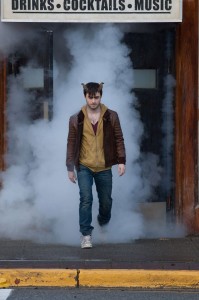The supernatural runs a little too wild in Horns
A grisly murder, a false accusation and a protagonist who wakes up one morning to find there are horns growing out of his head. This is the premise behind Alexandre Aja’s newest movie, Horns, based on the novel of the same name penned by Joe Hill. After premiering at the 2013 Toronto International Film Festival to mixed reviews, the film is set for general release this Halloween. This is perhaps the perfect release date for the gothic drama, which features not only a man who grows horns with supernatural powers, but also vicious snake attacks and the murder and rape of a beautiful young woman in the woods. Though the original novel was a major success, the film does not quite live up to its literary counterpart, with Daniel Radcliffe’s performance, as well as the script and direction, falling short.
The main problem with the film is that it can’t decide what it wants to be. It certainly contains enough bloodshed and physical calamity to be considered horror. Yet, it also contains a few scattered comical moments — or at least the way in which Radcliffe’s horns cause people to reveal their most immodest desires is certainly intended to be humorous. In addition, the moment when Radcliffe sprouts wings and flies into the air during the climactic fight scene is so ridiculous it is unclear whether it is supposed to be taken seriously. The comic elements, however, are inconsistent and not funny enough to put this film into the genre of dark comedy. There is also romance, drama and tragedy; however, the issue is that Horns neither picks one of these genres to occupy entirely, nor does it blend together the mesh of genres it attempts seamlessly. This leaves the audience uncertain as to what the film’s intentions really are.
The film focuses on Ig Perrish, a radio D.J. in a small town played by Harry Potter alum Radcliffe. Ig’s longtime girlfriend Merrin (Juno Temple) is found raped and murdered, and Ig is the prime suspect. Suddenly he finds himself a pariah among his closest friends and family, none of whom believe he is innocent. Then one morning, Perrish discovers that a pair of horns, which seem to imbue him with paranormal abilities, has sprouted from his head overnight. Whomever he crosses paths with suddenly receives the urge to expose their deepest secrets; this includes a mother confessing intimate details of her affair with her golf trainer (all in front of her young daughter), a doctor and nurse having sex in a chair mid-surgery and even Ig’s own parents confessing their resentment and dislike of their son.
Some of the aspects intended to be comical here simply end up appearing lewd and awkward, not helped by some rather wooden supporting performances. Ig decides to use his newfound powers to discover Merrin’s true killer, and during the process he finds himself being followed by an adoring group of snakes, willing to obey his every command. No need to read too deeply into the religious parallels here; Radcliffe is indeed becoming Satan himself, complete with red skin.
Flashback sequences reveal clues to the identity of the true perpetrator in Merrin’s murder, while the present-day scenes take the audience through a series of very dark and surprising events. As Ig becomes steadily more desperate, his behavior becomes more ruthless, driven by the continued cruelty of those around him. The humanity behind this devilish character is clearly taken rather heavily from Paradise Lost, made clear by references to John Milton’s text throughout the film. In addition, some of the concluding scenes are openly inspired by Dante’s Divine Comedy, further adding to the questions of religion and judgment in the plot.
Though a stronger lead performance probably couldn’t have saved this movie, it certainly would have helped. Radcliffe is not terrible, but he isn’t very impressive either. The complexity of emotion required by the role is significant, and in some of the more intensely emotional sequences, Radcliffe doesn’t quite manage to convince the audience of Ig’s plight.
The message of the movie is unclear. The powers of the horns suggest that below the façade everyone presents, people are controlled by their carnal desires: truly thinking of little more than sex, violence and gluttony. This rather bleak outlook on the human condition is paired with the suggestion that society is always ready to jump to conclusions and outcast our own without a second thought.
Still, no one could accuse this film of being unoriginal. The complex plot and various twists are executed well, and the action is complemented with notable characterization and psychological exploration. Though it is unlikely to break any records, it certainly brings up some interesting questions about religion and human nature. In the end, though, Horns tries too hard to be both astute and widely appealing, to combine a plethora of ideas while attempting to both shock and excite its audience. Sadly, it does not fully manage any of those feats.

